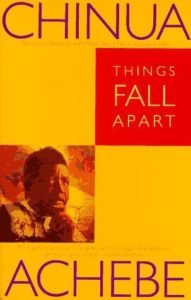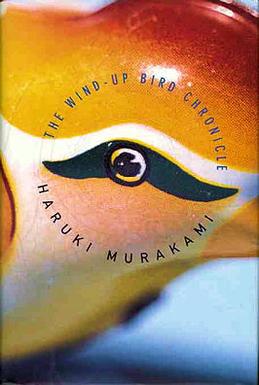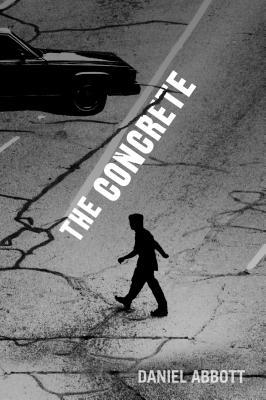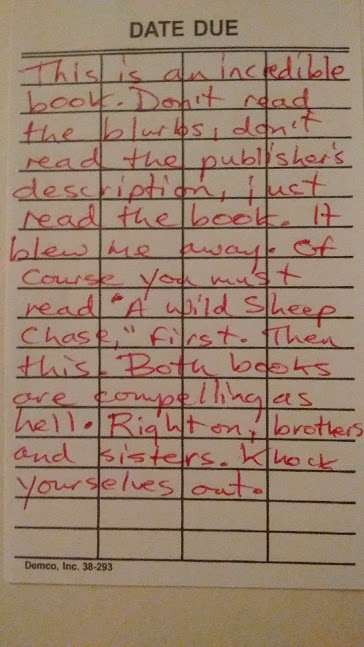 Sometimes a reader is simply not prepared for the world they encounter within a book’s pages. “This dude is hard to like,” is my strongest memory from my first reading of Things Fall Apart and its main character, Okonkwo. This giant of a man is an often terrifying presence to those around him: opinionated, prideful, and patriarchal as all get-out. In one fit of rage, he even fires a gun at one of his wives, who barely escapes with her life. It would have been hard to be more ideologically at odds with a character than I was with him, and I was left feeling dismayed that I did not connect much to what was considered a great work of literature.
Sometimes a reader is simply not prepared for the world they encounter within a book’s pages. “This dude is hard to like,” is my strongest memory from my first reading of Things Fall Apart and its main character, Okonkwo. This giant of a man is an often terrifying presence to those around him: opinionated, prideful, and patriarchal as all get-out. In one fit of rage, he even fires a gun at one of his wives, who barely escapes with her life. It would have been hard to be more ideologically at odds with a character than I was with him, and I was left feeling dismayed that I did not connect much to what was considered a great work of literature.
What I didn’t notice so strongly upon that first reading, some twenty or so years ago, was that I didn’t put the book down, even when I was most disagreeing with Okonkwo. The reasons for this are so much more clear to me now, on a second reading. From the very start, Chinua Achebe makes the world of his historical novel come to life—a reader is left feeling like they are living in Iboland, before and during the beginnings of European colonization. And he makes Okonkwo hard not to respect, despite all his faults.
Okonkwo was well known throughout the nine villages and even beyond. His fame rested on solid personal achievements. As a young man of eighteen he had brought honor to his village by throwing Amalinze the Cat. Amalinze was the great wrestler who for seven years was unbeaten, from Umuofia to to Mbaino. He was called the Cat because his back would never touch the earth. It was this man that Okonkwo threw in a fight which the old men agreed was one of the fiercest since the founder of their town engaged a spirit of the wild for seven days and nights. (opening paragraph, Things Fall Apart)
It is this careful balancing of contrasts that drives the novel’s power. Okonkwo is as he is because his father was frequently in debt, preferred music to physical labor, and was deemed cowardly by their community. We can even feel sympathy (or at the very least understanding) for Okonkwo when holding to his personal ideal of masculinity and identity costs him dearly. When the village’s oracle states that Okonkwo’s adopted son must die, Okonkwo not only allows this to happen to his adopted son—a boy he loves more than his own flesh-and-blood son, Nwoye—Okonkwo even takes part in the ritual killing so as not to be seen as weak by his clan. And for weeks afterward, the man is unable to understand why he has no desire to work. The killing had to be done, and so he did it. Grief is not in his vocabulary, even if he cannot help but feel it.
The tale is more than a Shakespearean tragedy, however: it’s seen as the defining work of post-colonial literature because of how it uses contrasting details to highlight strengths and weaknesses of Ibo culture before the arrival of Europeans, as well as the damages (and benefits) Europeans brought with them. As Kwame Anthony Appiah states in his excellent introduction to the Everyman’s edition of the novel, “Achebe’s rigorous accounting includes columns both for profit and loss.”
The first Christian missionary to the region develops strong relationships with the community, becoming friends even with those he is not able to convert to his religion. When he becomes sick and departs back to England, his replacement is of the fire and brimstone variety, pushing the community to a violent confrontation that ultimately leads to Okonkwo’s death. Another notation in the column for profit, or benefit, is both missionaries’ objection to the local culture’s tradition of leaving twin babies in the woods to die (twins are seen as evil).
Even with all this careful balancing, there is a clear condemnation of the myopic and biased view of the European colonizers. By the novel’s end, we have seen the breadth of Iboland’s culture: its economy, its family life, its religion, its system of justice, even its love of wrestling (the frenzied, communal description of a wrestling event is not all that different from how a writer would try to bring to life a modern game of high school football). It is a place with its own traditions and values. Some better or worse, perhaps, but not on a qualitative whole worse than that of the Europeans who have recently arrived.
So on its final page, when the novel switches to the European viewpoint of the local district commissioner, a reader is hard pressed not to recoil when the commissioner notes the death of Okonkwo as a mere curiosity or anecdote—something to use in a book he is writing about his experiences in Africa.
One could almost write a whole chapter on him. Perhaps not a whole chapter but a reasonable paragraph, at any rate. There was so much to include, and one must be firm in cutting out details. He had already chosen the title of the book, after much thought: The Pacification of the Primitive Tribes of the Lower Niger. (final paragraph, Things Fall Apart)
Unlike Achebe’s “rigorous accounting” (as Appiah put it), this is unbalanced accounting of the worst kind. The commissioner has but one column for the Ibo—primitive—and he twists all evidence to fit this or ignores it entire. And Achebe has forced his readers to see this clearly, with no ifs, ands, or buts. What a marvel.




